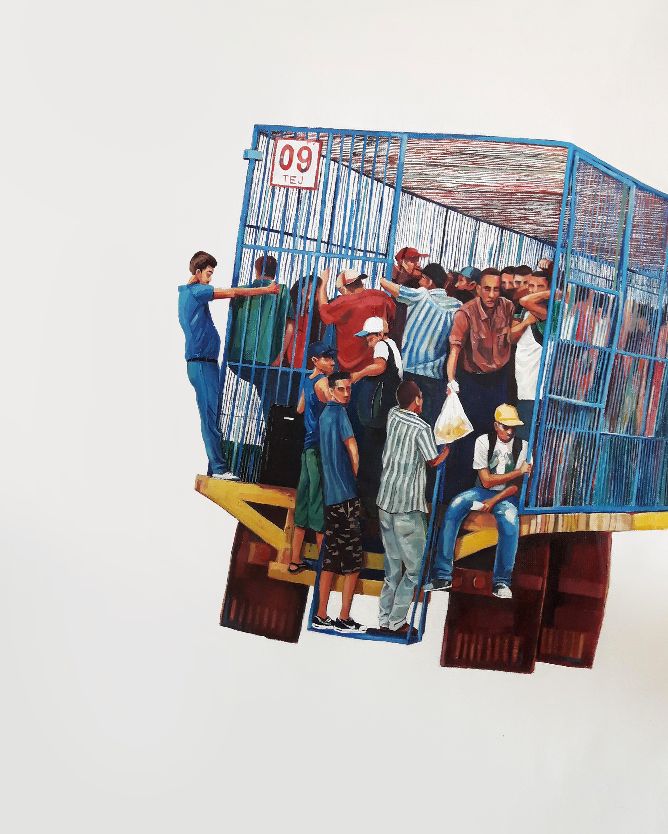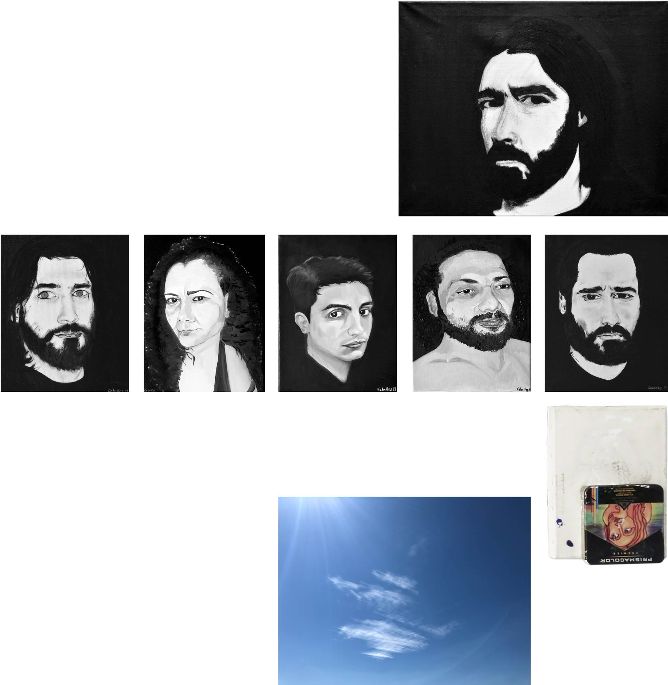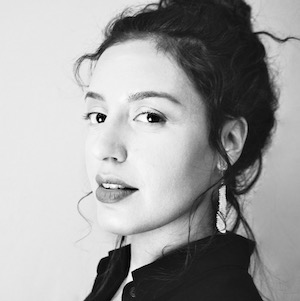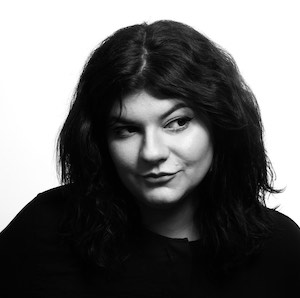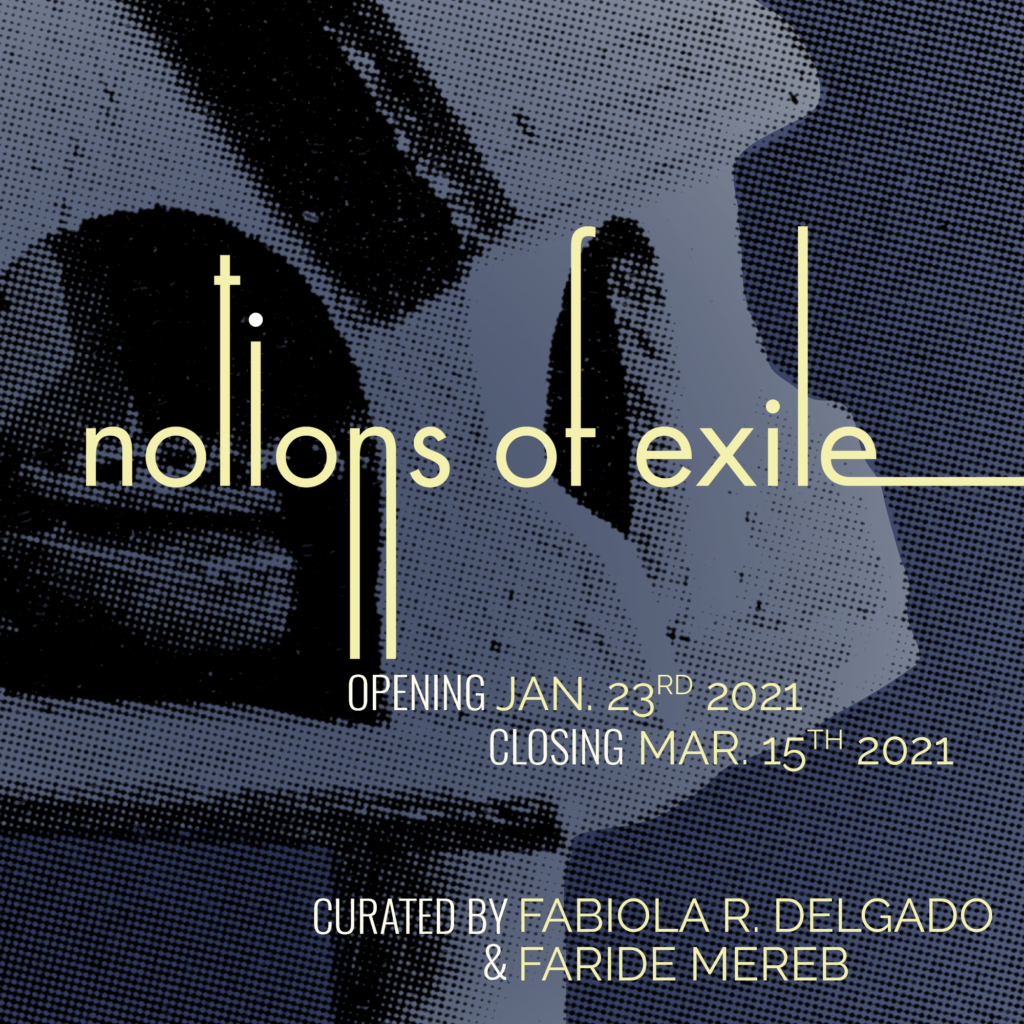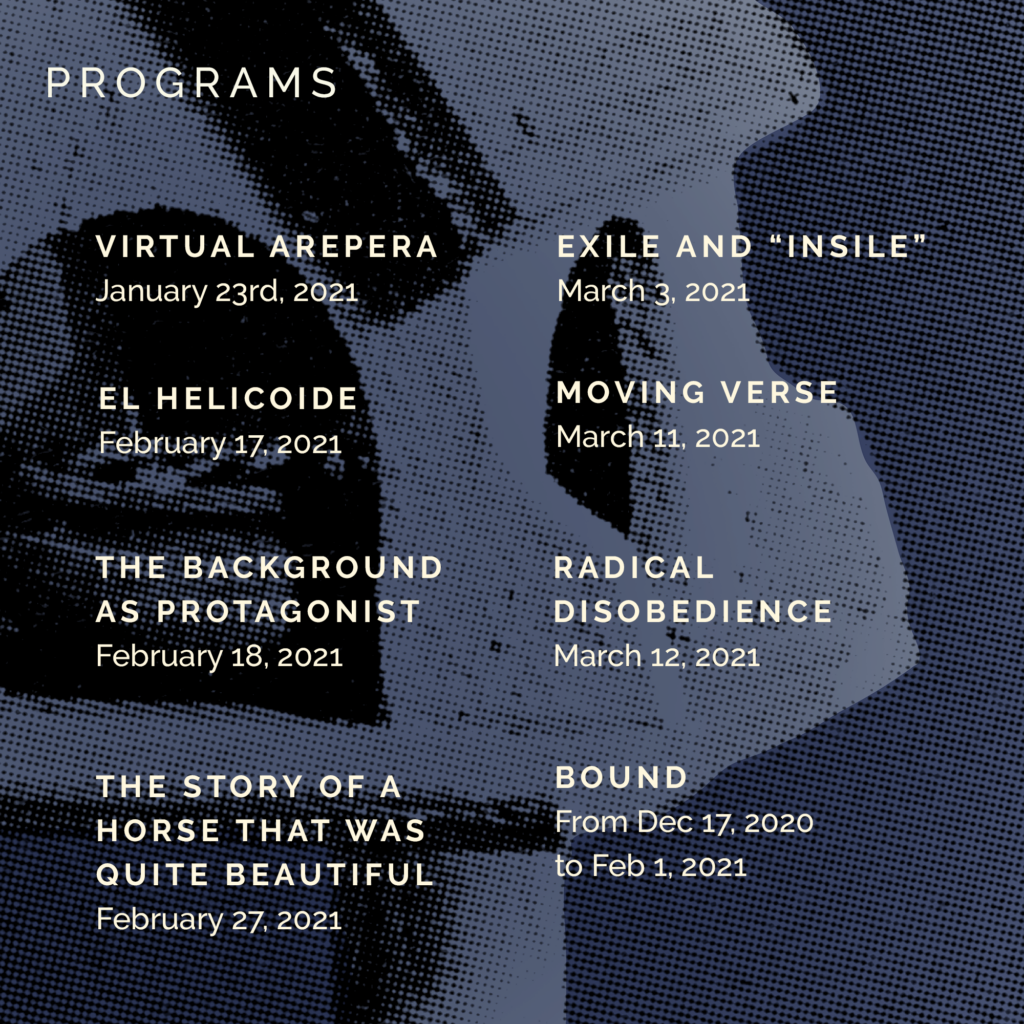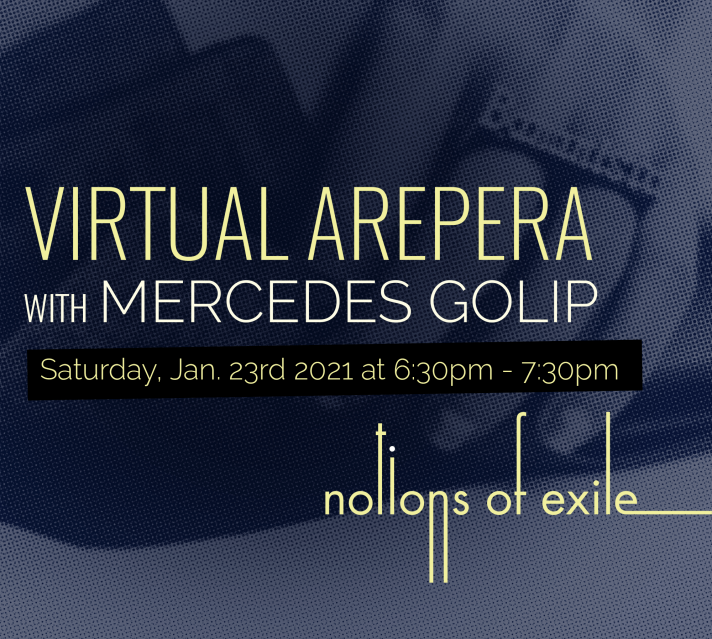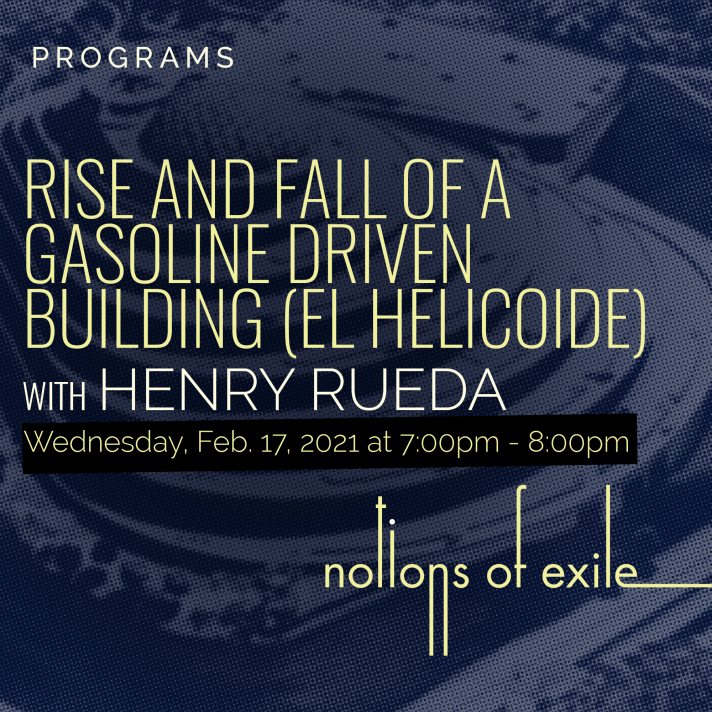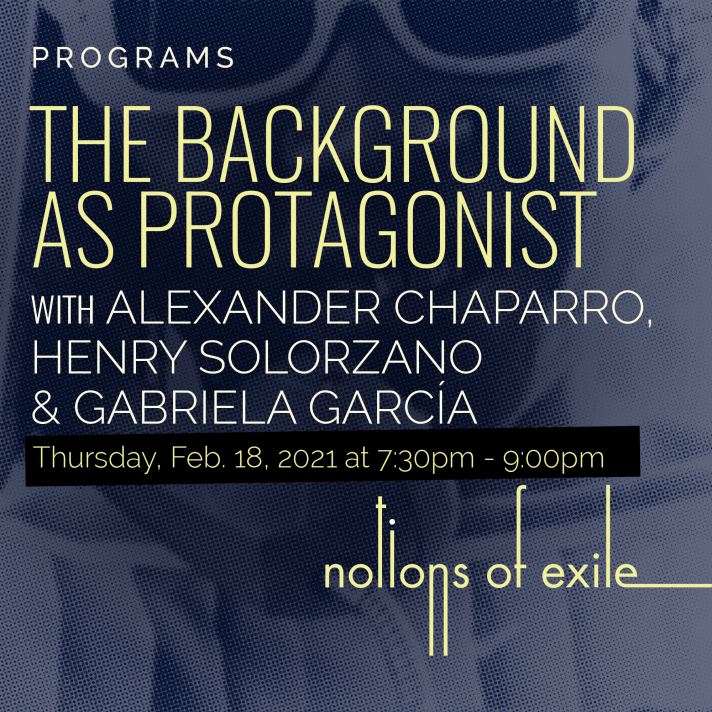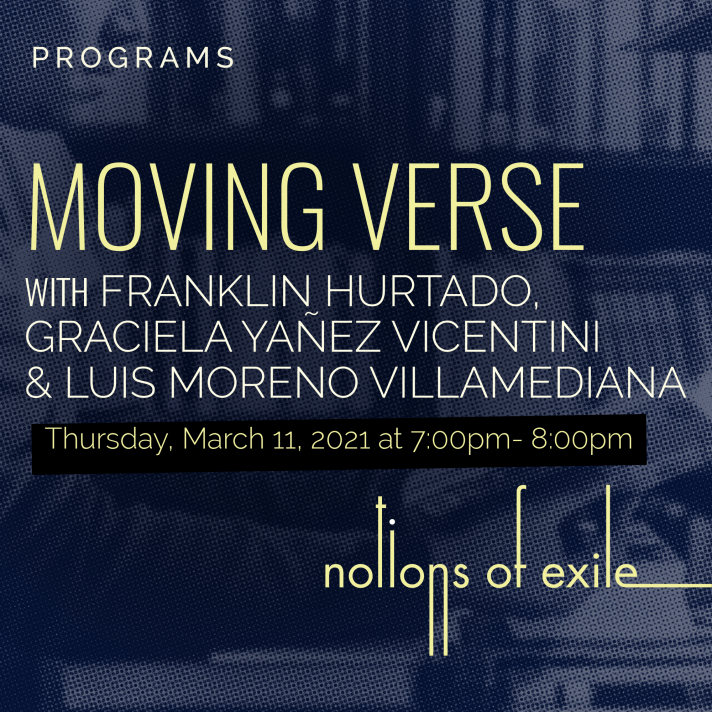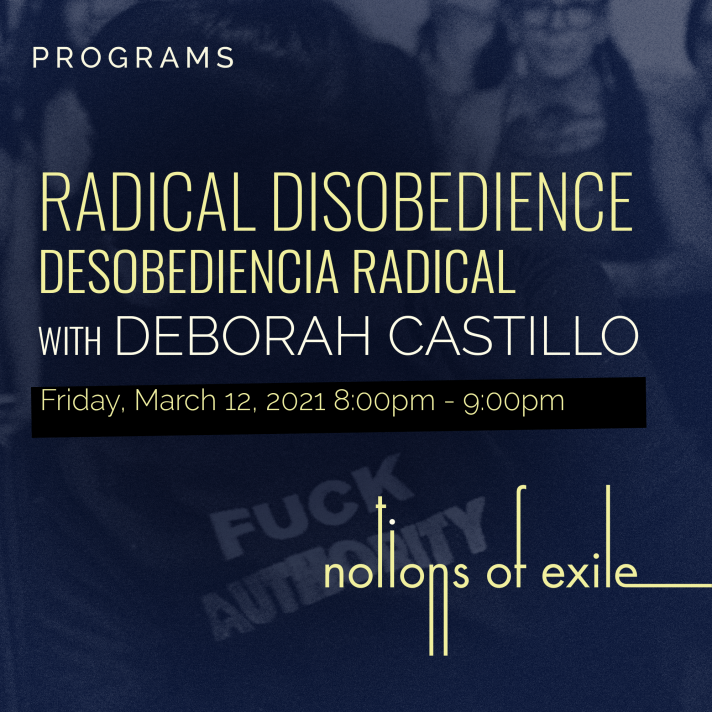Notions of Exile is a bilingual virtual exhibition and series of programs, co-curated by Fabiola R. Delgado and Faride Mereb. The project explores the cultural influence of the largest recorded refugee crisis in the Americas—the forced migration of six million Venezuelans from their homeland—using Venezuelan writer and journalist Aquiles Nazoa’s stories of exile and migration as a metaphorical “table” around which the co-curators have gathered artists from Venezuela and its diaspora. Notions of Exile raises questions about how this story of exile is told and how words like mestizaje, a concept deeply ingrained in the Venezuelan collective psyche to describe assimilation, gain distinct meaning when home is somewhere new. The co-curators and participating artists, scholars, writers, architects, and activists utilize archival documentation, photographs, contemporary painting, drawing, video, and performance to interpret the Venezuelan emigration experience and consider these inquiries.
The virtual exhibition features artwork by Miguel Braceli, Diana López, Génesis Alayón, Samoel González, and Faride Mereb and can be accessed here.
The program participants included Leonardo Almao, Deborah Castillo, Alexander Chaparro, Gabriela García, Mercedes Golip, Franklin Hurtado, Henry Rueda, Henry Solórzano, Ugo Ulive, Graciela Yáñez Vicentini, and Luis Moreno Villamediana.
About the Artists & Participants
Génesis Alayón is an artist researching social plots through portraiture, highlighting themes of displacement, absence, and belonging. They have presented their work in exhibitions and salons at Espacio Proyecto Libertad (Mérida), Universidad Católica Andrés Bello (Caracas), Hacienda La Trinidad (Caracas), Hacienda La Trinidad (Caracas), and the National Salon of Young Maczul Artists (Maracaibo). Alayón is currently studying Visual Arts at the University of the Andes in Venezuela.
Leonardo Almao has participated in various group exhibitions and received awards in salons in Venezuela such as the Salón Octubre Jóven, Salón Nacional de las Artes del Fuego, Salón Nacional de Arte Aragua, among others. Internationally, he has participated in group exhibitions in Bazancourt, Paris, Madrid, and Miami. He was recently selected for the Eugenio Mendoza #16 Award in Caracas. His solo exhibitions include “Perfect Monsters” at Museo de Arte (Valencia) and “Todo albergue es transitorio” at Galería Spazio Zero (Caracas). His recent work is based on the axiom that archeology of materials is a human archeology. He lives and works in Valencia, Venezuela, and is a graduate of the Arturo Michelena School of Plastic Arts.
Miguel Braceli is a multidisciplinary artist working at the intersection between art, architecture, and education. His practice is focused on participatory projects in public space. Most of these projects have been large-scale works, developed in countries such as Argentina, Bolivia, Chile, Costa Rica, México, Spain, Sweden, United States, and Venezuela. These works explore notions of borders, migrations, national identities, and social-political conflicts, working from the geopolitical geography to a human scale. Braceli’s collective performances have been presented in Matadero Madrid, LABoral Centro de Arte y Creación Industrial (Asturias), and the University Museum of Contemporary Art (Mexico City). His most recent recognitions include being a Sondheim Prize Finalist (2020), Future Architecture Fellow (2019) and Leslie King Hammond Fellowship Award MICA (2018). Braceli is a Associate Professor in the Faculty of Architecture at the Central University of Venezuela, and has led various participatory and educational projects with institutions such as the Museum of Modern Art (New York), the Museum of Fine Arts of Caracas, the Embassy of United States, and the Embassy of Spain in Venezuela. He is currently a Fulbright Scholar working and living in the United States.
Deborah Castillo is a Venezuela-born, Brooklyn-based multidisciplinary artist. Castillo has been granted numerous awards and residencies including the NYFA Immigrant Artist Mentoring Program (2015) and The Banff Center Artist-in-Residence Program (2015). Her work has been exhibited at the Museum of Arts and Design (NYC), New Museum (NYC), Rufino Tamayo Museum, (Mexico City), Carrillo Gil Museum (Mexico City), “SIART” the Bolivian Biennial (La Paz), ICA (London), and Palais de Tokyo (Paris), among others.
Alex Chaparro is an artist from Caracas, currently based in Brooklyn. They work on creative projects that highlight the potentials of collaboration and collective organizing. Chaparro contributes to Tercer Mundo Editorial, a publishing initiative that connects young writers and visual artists from Latin America to collaborate on artist books, photo essays, as well as the online/printed magazine Súper Jodido.
Gabriela García is a Venezuelan artist based in Caracas, who researches visual anthropology, using mixed media to generate pictorial translations based on figurative images. She currently experiments with photography and video as a way to create an immediate and nomadic language. Among her many exhibitions are the XXII Youth Hall with FIA (Caracas), “Omisión Ligera” at Cerquone Projects Gallery (Caracas), and “Fuga cotidiana en sol,” a short film collaboration with Lorismar Franco at Galerie Bernhard Bischoff & Partner AG (Bern).
Mercedes Golip is a creative and curious cook, marketing consultant, and media developer from Venezuela currently based in Queens. With her experimental culinary project, “My Kitchen, Farm to Table,” she creates Venezuelan-inspired food with American ingredients; each menu crafted and planned seasonally, combining flavors, ideas, and ingredients from a new geographical and social context.
Samoel González is a graphic designer and photographer based in New York, with a passion for unmediated experiences in public spaces. He received his Associate’s Degree from Colegio Universitario Monseñor de Talavera in Valencia, Venezuela, and upon his graduation, he completed a residency at the global innovation hub from Telefónica, Wayra, an incubator, and developer for tech startups in Latin America. Prior to moving to New York, he was an UX designer, and the Creative Director for the Chilean startup <PleIQ>, where he specialized in augmented reality for literacy education.
Franklin Hurtado is a poet and educator. He has taught literature at the Universidad Central de Venezuela, and worked as a copywriter and editor. In 2012, he won the award for new authors in poetry by Monte Ávila Editores with his first book, Sal (Salt), which was published in 2013. That same year, he got a special mention in the II Premio Equinoccio de Poesía Eugenio Montejo for a first version of Miel negra (Black Honey), published in 2020. His poetry has been included in anthologies such as destinos portátiles, muestra de poesía venezolana reciente (portable destinations, sample of recent Venezuelan poetry).
Diana López is a Venezuelan visual artist, cultural manager, and activist. She developed her artistic style in the 1990s, focusing on participation and collaboration with other creators in the production of her pieces. In 1994, she became the first woman to receive the Eugenio Mendoza Art Prize. In 1996, she participated in the MoMa Ps1 International Program. Her work includes photography, video, performance, and installations. López has worked for over two decades in cultural institutions devoted to local development and community participation. When she was the Director of Cultura Chacao (Caracas), she implemented strategies to revitalize urban communities including through public art programs, street festivals, and the construction of a mighty infrastructure: the Centro Cultural Chacao and the Library of Los Palos Grandes. She is currently the Director of Archivo Fotografía Urbana and activist of @accionlibertad.
Henry Rueda holds a degree in architecture from the Central University of Venezuela and a Master’s in Advanced Architectural Design from the Graduate School of Architecture, Planning, and Preservation at Columbia University. He has taught at José María Vargas University, Central University of Venezuela, and Simón Bolívar University. His professional experience includes working for Jesus Tenreiro in Caracas, and Wiel Arets in Maastricht. Rueda’s current work focuses on single family residences in different cities in Venezuela and in Miami. In 2014, his VL House was nominated for the Emerging Architects Mies Crown Hall Prize of the Americas, organized by the Illinois Institute of Technology in Chicago.
Henry Solórzano was born in Caracas and studied art at the Central University of Venezuela. One of his most important productions has been 30 dias de patineta, filmed between the years 2016 and 2018. It won the Indie Short Film Fest award and also got nominated in the Best Male Student Director category at the Central University of Venezuela. He currently lives in New York City.
Ugo Ulive (1933–2018) was a theater director, actor, playwright, novelist, and filmmaker. Of Uruguayan origin and a nationalized Venezuelan, Ulive began his artistic career as a radio actor in his hometown. He was part of the Community of Independent Theater Actors of Montevideo where he developed the field of acting and especially theater directing. In 1961, he went to Havana and directed the National Theater of Cuba and founded the National School of Dramatic Arts. He returned to his country for a short time and in 1967 he was invited to work in Caracas for three months with the New Group, prolonging his residence in the country until the day of his death. The documentary Basta (1969) is an important representative of Venezuelan experimental cinema.
Graciela Yáñez Vicentini is a writer, editor, cultural promoter, proofreader, translator, and bookseller. She was editorial coordinator to the Papel Literario of El Nacional newspaper. She is now cultural manager at Ediciones “Letra Muerta”, assistant editor at Fundación La Poeteca, and co-editor to the collection Los rostros del futuro (The Faces of the Future) by Banesco. Her heteronym Egarim Mirage has published the poetry books: Espejeos al espejo (Mirages to the mirror) and Íntimo, el espejo (Intimate, the mirror). Her work has been featured in anthologies, journals, and magazines in Mexico, Spain, and Venezuela. Yáñez Vicentini’s poems were translated into English for the bilingual sample of Venezuelan poetry Lectura de la diáspora (Readings from the Diaspora) from Latin American Literature Today by Oklahoma University. She was awarded second place in Poetry by Ateneo de Caracas (1997), various recognitions in Narrative and Poetry in the Literary Festival by the UCV (2001, 2002, 2004), was a finalist in the short fiction contest Mosaico by the Embassy of Argentina/FILUC (2017), and received a special mention in the Transgeneric Annual Contest by the FCU (2017).
Luis Moreno Villamediana is a poet, narrator, essayist, critic, translator, and professor at the University of Los Andes. His poetry has been published in Cantares digestos (1996), Manual para los días críticos (2001), En defensa del desgaste (2008), Eme sin tilde (2009), Laphrase (2012), and Otono (sic) (2017). As a narrator, he published El edificio fantasma in 2015. He has received the José Rafael Pocaterra Biennial Poetry Prize (1992), Juan Antonio Pérez Bonalde International Poetry Prize (1997), Eugenio Montejo Equinox Poetry Prize (2011), First Prize of the Guillermo Meneses National Short Story Competition (2011), Book of the Year Book of the Booksellers Award, poetry category (2013), Children’s Literature Prize of the Sor Juana Inés de la Cruz International Literature Contest (Mexico, 2014), Salvador Garmendia Annual Short Story Prize (2016), and Eugenio Montejo Literary Biennial Essay Prize (2017).
About the Curators
Faride Mereb is a Venezuelan artist, award-winning book designer, teacher, researcher, and founder of publishing house Ediciones Letra Muerta. She currently lives in NYC with her husband, where she teaches and designs. Mereb is a visiting scholar at Columbia University exploring North and South Americas’ hybridity through its printing and book history.
Fabiola R. Delgado is a Venezuelan Human Rights Lawyer turned independent curator, creative consultant, and program specialist at the Hirshhorn Museum. As Amnesty International Regional Manager in Venezuela, her activism proved too dangerous, forcing her to move to the United States where she currently seeks political asylum, and dedicates herself to finding justice through artistic and cultural expressions. She strives for thought-provoking and imaginative projects that bring forward different perspectives, ignored, and forgotten stories. R. Delgado has worked with the Smithsonian Institution, The Embassy of Spain, Times Square Arts, The Center for Book Arts NYC, MacArthur Fellow Mel Chin, and the Obama White House.
The curators would like to extend a special thank you to Álvaro Sotillo for donating the use of his font for Notions of Exile.
Select Press
“Notions of Exile” by Manuel Vásquez-Ortega published by Prodavinci on March 12, 2021 (in Spanish)
Brooklyn Rail “Common Ground” conversation with co-curators and participating artists on February 18, 2021 (in English)
“Notions of Exile” featured in Letralia, Tierra de Letras on February 5, 2021 (in Castilian)
Supporters
This and other WPA projects are made possible by the DC Commission on the Arts and Humanities, which receives support from the National Endowment for the Arts; The Andy Warhol Foundation for the Visual Arts; Bloomberg Philanthropies; The Corcoran Women’s Committee; The Morris & Gwendolyn Cafritz Foundation; Glenstone Foundation; Hickok Cole Architects; White&Case; and many other generous foundations, corporations, and individuals.


